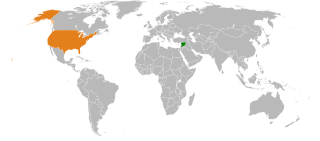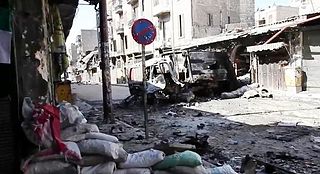Related Research Articles

Bashar al-Assad is a Syrian politician, military officer, and former dictator who served as the 19th president of Syria from 2000 until his government was overthrown by Syrian rebels in December 2024. As president, Assad was commander-in-chief of the Syrian Armed Forces and secretary-general of the Central Command of the Arab Socialist Ba'ath Party. He is the son of Hafez al-Assad, who ruled Syria from 1971 until his death in 2000.

Bassel al-Assad was a Syrian military officer, engineer and politician. He was the eldest son of the 18th Syrian president Hafez al-Assad. He was expected to succeed his father as president until his death in a car crash in January 1994. After his death, his younger brother Bashar became heir apparent to the Syrian presidency and ultimately succeeded their father upon his death.

Rifaat Ali al-Assad, known as the "Butcher of Hama", is a Syrian former military officer and politician. He is the younger brother of the late President of Syria, Hafez al-Assad, and Jamil al-Assad, and the uncle of the former President Bashar al-Assad. He was the commanding officer of the ground operations of the 1982 Hama massacre ordered by his brother.

There has been a varying nature of human rights under various governments that ruled Syria since the French colonial rule in Syria starting in the 1920s.

Fenethylline or fenetylline (INN) is a codrug of amphetamine and theophylline and so a mutual prodrug of both. It is also spelled phenethylline; other names for it are amphetamin

Syria, officially the Syrian Arab Republic, is a country in West Asia located in the Eastern Mediterranean and the Levant. It is bounded by the Mediterranean Sea to the west, Turkey to the north, Iraq to the east and southeast, Jordan to the south, and Israel and Lebanon to the southwest. It is under a transitional government and comprises 14 governorates. Damascus is the capital and largest city. With a population of 25 million across an area of 185,180 square kilometres (71,500 sq mi), it is the 57th-most populous and 87th-largest country.

Although relations began in 1835, diplomatic relations between Syria and the United States are currently non-existent; they were suspended in 2012 after the onset of the Syrian Civil War. Priority issues between the two states include the Arab–Israeli conflict, the Golan Heights annexation, alleged state-sponsorship of terrorism, etc. As of 2025, the United States had begun to work with the new Syrian government after the collapse of the former regime under the Assad family.

The mass media in Syria consists primarily of television, radio, Internet, film and print. The national language of Syria is Arabic but some publications and broadcasts are also available in English and French. While television is the most popular medium in Syria, the Internet has become a widely utilized vehicle to disseminate content. Transcending all available media, the government seeks to control what Syrians see by restricting coverage from outside sources. Publications and broadcasts are monitored by members of the government. All mass media outlets are under the supervision of the Ministry of Information. Third article of the 2013 Information Ministry guidelines stipulate that purpose of all media outlets is "to enlighten public opinion" in line with the ideological doctrines "of the Arab Socialist Ba’ath Party and the policy of the state".

The Assad family ruled Syria from 1971, when Hafez al-Assad became president under the Ba'ath Party following the 1970 coup, until Bashar al-Assad was ousted on December 8, 2024. Bashar succeeded his father, Hafez al-Assad, after Hafez's death in 2000.
Internet censorship in Ba'athist Syria was extensive; with numerous websites and online platforms being banned for political reasons. Internet usage was authorized only through state-run servers and people accessing through other means were arrested. Filtering and blocking was found to be pervasive in the political and Internet tools areas, and selective in the social and conflict/security areas by the OpenNet Initiative in August 2009.

The Syrian civil war is an ongoing multi-sided conflict in Syria involving various state-sponsored and non-state actors. In March 2011, popular discontent with the rule of Bashar al-Assad triggered large-scale protests and pro-democracy rallies across Syria, as part of the wider Arab Spring protests in the region. After months of crackdown by the government's security apparatus, various armed rebel groups such as the Free Syrian Army began forming across the country, marking the beginning of the Syrian insurgency. By mid-2012, the insurgency had escalated into a full-blown civil war.
Rami Makhlouf is a Syrian businessman and a maternal cousin of former president Bashar al-Assad. At the beginning of the Syrian civil war in 2011, he was considered one of Syria's richest and most powerful men. According to Syrian analysts, he was part of al-Assad's inner circle and no foreign company could do business in Syria at the time without his consent and partnership.
This is a broad timeline of the course of major events of the Syrian civil war. It only includes major territorial changes and attacks and does not include every event.
The level of Internet censorship in the Arab Spring was escalated. Lack of Internet freedom was a tactic employed by authorities to quell protests. Rulers and governments across the Arab world utilized the law, technology, and violence to control what was being posted on and disseminated through the Internet. In Egypt, Libya, and Syria, the populations witnessed full Internet shutdowns as their respective governments attempted to quell protests. In Tunisia, the government of Zine El Abidine Ben Ali hacked into and stole passwords from citizens' Facebook accounts. In Saudi Arabia and Bahrain, bloggers and "netizens" were arrested and some are alleged to have been killed. The developments since the beginning of the Arab Spring in 2010 have raised the issue of Internet access as a human right and have revealed the type of power certain authoritarian governments retain over the people and the Internet.

The Axis of Resistance is an informal coalition of Iranian-supported militias and political organizations across the Middle East. Formed by Iran, it unites actors committed to countering the influence of the United States and Israel in the region.

The Syrian Electronic Army was a group of computer hackers which first surfaced online in 2011 to support the government of Syrian President Bashar al-Assad. Using spamming, website defacement, malware, phishing, and denial-of-service attacks, it has targeted terrorist organizations, political opposition groups, western news outlets, human rights groups and websites that are seemingly neutral to the Syrian conflict. It has also hacked government websites in the Middle East and Europe, as well as US defense contractors. As of 2011, the SEA has been "the first Arab country to have a public Internet Army hosted on its national networks to openly launch cyber attacks on its enemies".

The history of Syria covers events which occurred on the territory of the Syrian Arab Republic and events which occurred in the region of Syria. Throughout ancient times the territory of the Syrian Arab Republic was occupied and ruled by several empires, including the Sumerians, Mitanni, Assyrians, Babylonians, Egyptians, Hittites, Canaanites, Phoenicians, Arameans, Amorites, Persians, Greeks and Romans. Syria is considered to have emerged as an independent country for the first time on 24 October 1945, upon the signing of the United Nations Charter by the Syrian government, effectively ending France's mandate by the League of Nations to "render administrative advice and assistance to the population" of Syria, which came in effect in April 1946.

AANES–Ba'athist Syria relations concern the military and political relations between the Ba'athist Syrian Arab Republic and the Autonomous Administration of North and East Syria (AANES), a de facto autonomous multi-ethnic region in northern and eastern Syria. The Syrian government does not officially recognise the autonomy of the AANES, and advocates a centralist approach to the governance of Syria. The NES seeks the federalisation of Syria. For most of the Syrian civil war, there has been a non-aggression pact between the military of Syria and the Syrian Democratic Forces, with occasional confrontations and some cooperation against Islamist groups, in particular against the Turkish Armed Forces and the Turkish-backed Syrian National Army. While the two sides co-operated militarily under Russian supervision since 2019, with Syrian and Russian troops stationed along the Turkish border to prevent further advances, political negotiations have ended in failure. The Syrian government has no authority or institutions in North and East Syria outside of its two security boxes in Qamishli/Qamislo and Al-Hasakah/Heseke. The Autonomous Administration did not allow the Syrian Government to hold elections in areas under its control.
The Syrian Network for Human Rights is a UK-based independent monitoring group, which monitors casualties and briefs various United Nations agencies. It monitors Syrian casualties of all the parties in the Syrian civil war. The SNHR was founded in June 2011 by Fadel Abdul Ghany, who is the chairman of the board of directors. Members have been detained, and many now live outside Syria.

The 2012–2013 escalation of the Syrian Civil War refers to the third phase of the Syrian Civil War, which gradually escalated from a UN-mediated cease fire attempt during April–May 2012 and deteriorated into radical violence, escalating the conflict level to a full-fledged civil war.
References
- ↑ Alterman, Jon B. (1998). "New Media New Politics?" (PDF). The Washington Institute. 48. Archived from the original (PDF) on 13 May 2013. Retrieved 7 April 2013.
- 1 2 Sean Gallagher (May 8, 2013). "Network Solutions seizes over 700 domains registered to Syrians". Ars Technica. Retrieved 2013-05-09.
- 1 2 "Trade Sanctions Cited in Hundreds of Syrian Domain Seizures". Krebs on Security. 8 May 2013. Retrieved 2013-05-09.
- ↑ "Hunting for Syrian Hackers' Chain of Command". The New York Times. 17 May 2013. Retrieved 2016-10-18.